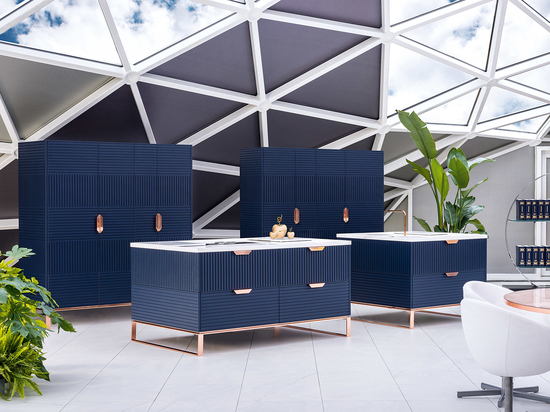
#Product Trends
Kitchen worktops: when limits do not exist
Materials, thicknesses, colours, functionality, aesthetics, textures. Even the worktops boast their own precise personality. From the warmth of wood to the coolness of steel and natural or composite stone, from important and decisive thicknesses to dematerialized surfaces, playful volumes or continuous surfaces with integrated multifunctional areas.
Table of Contents:
Worktop materials
Worktop in marble, stone or granite
Worktops in quartz
Synthetic work plans: Stoneware, Solid Surface, High Pressure Laminate
Stainless steel: chef-approved worktops
Worktop in Ecomalta
Types of worktops
Kitchen worktop with snack top
Accessories, appliances and home automation for worktops
Worktop materials
When designing a kitchen space, the choice of worktop is one of the most important aspects. Unlike the doors, the worktop comes into daily contact with food and performs different functions in the preparation of food, resulting in the need for its higher technical characteristics and resistance.
At the same time it must maintain the aesthetic continuity of the whole environment. While choosing the right material, therefore, two concepts coexist: that of experience (aesthetics, tactility) and that of performance.
Natural materials such as stones, marbles and metals favour the experiential sphere, while synthetic materials and solid surfaces often boast unparalleled technical characteristics.
Worktop in marble, stone or granite
Among the natural materials suitable for worktops are marble, natural stone and composite stones such as quartz and granite. Marble and natural stones undoubtedly have their charm due to their exquisite uniqueness: no two stone worktops will ever be the same because the natural material that is extracted changes from slab to slab in terms of nuance and grain.
Among stones and marbles we find the most decisive textures, ranging from strong contrasts to soft ton-sur-ton with a more homogeneous surface. The naturalness of these materials requires a little more care due to their porosity and the particular molecular structure, which makes them vulnerable to aggressive chemicals or acid/greasy substances contained in foods.
To diminish the possibility of these natural materials from being stained, waterproofing treatments and micro-surface processing can be applied. For greater aesthetic continuity, the sink can also be assembled in stone, thus achieving a perfect combination of function and attention to detail. Among the natural stones we also find granite, of volcanic origin, which is more resistant to both heat and abrasion.
Worktops in quartz
Quartz has physical-mechanical properties that combine naturalness with resistance and it is among the hardest minerals in the world. Quartz worktops contain about 10% resins, so they are not porous and do not need to be waterproofed.
Thanks to these characteristics, quartz resists practically everything: liquids, commonly used chemicals, heat, pressure. However, it is recommended to use a trivet to reduce the risk of discoloration or heat stress.
Read more:














